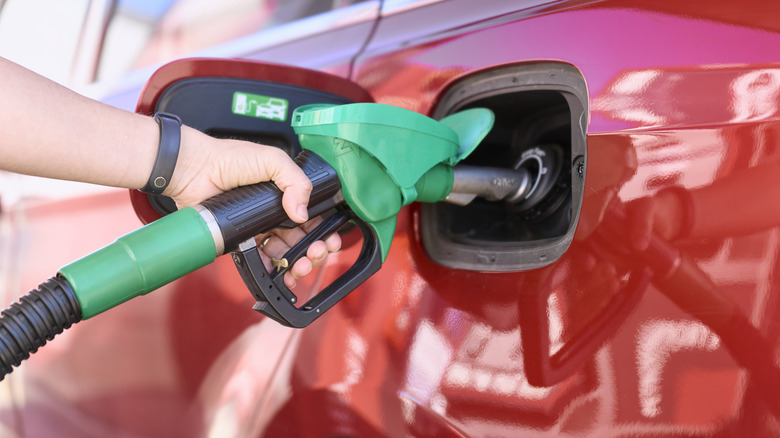Is It Worth Using Regular Gas In A Flex Fuel Vehicle?
Sometimes, drivers don't even realize they own a flex-fuel vehicle. If your car has a small label near the yellow gas cap that says E85 or Flex Fuel, then you're in luck. Obviously, these cars look and drive just like any regular gas-powered vehicle, but their engines are built to handle something a little different, and that would be ethanol-based fuel blends. Whether it's 10% ethanol or 85%, your car's engine can adapt without you lifting a finger.
So now comes the real question — if your flex-fuel car can run on both, should you even bother using anything other than regular gas? Is there any benefit to switching, or are you better off sticking with what you know? It sounds like a pretty straightforward choice, however, once you start weighing things like cost, performance, and even the fuel's impact on your engine, it's not as cut-and-dry as it seems.
The pros of ethanol-based fuel
One of the biggest advantages of using ethanol-blended fuel is the environmental one. As ethanol burns cleaner than traditional gasoline, it produces fewer harmful emissions and greenhouse gases. Plus, if you're someone who cares about reducing your carbon footprint, then E85 gas gives you a way to do that without switching to a hybrid or electric car. It's made from renewable crops like corn or sugarcane, which means you're also helping support local agriculture just by filling up.
Another perk? Performance. Many drivers don't realize that high-ethanol blends like E85 can slightly boost torque and horsepower. Of course, it won't turn your sedan into a race car, but the effect is there. In many areas, E85 is cheaper than regular gas as well. Now combine that with potential tax credits in some states, and you've got a solid case for making the switch — or at least trying it when it's available. Sadly, many people think that ethanol is a bad choice for engines, and sometimes, they're right. That being said, if your engine is built for it, like in a factory flex-fuel vehicle, you won't have a problem.
What about sticking with regular gas?
Let's talk about the flip side. While using E85 might sound like a win, there are a few things you should definitely consider. Ethanol isn't as energy dense as gasoline, which means you might notice a drop in fuel economy. In other words, cheaper fuel doesn't always mean fewer stops at the pump. Since ethanol absorbs more moisture and dirt than gasoline, it can cause long-term engine wear if your vehicle isn't maintained properly, especially in older FFVs.
There's also the fact that regular gasoline is just easier to find. Not every gas station carries E85, and in some areas, it's nonexistent. Luckily, you can safely use regular gas in any flex-fuel vehicle without harming the engine, which is the biggest part of the appeal. So, if convenience and consistency are more important to you, then there's nothing wrong with sticking to standard fuel. But let us make it clear once more that either way, you're not damaging your car, and the decision really comes down to what matters more to you: Cost and performance, or convenience and availability.


